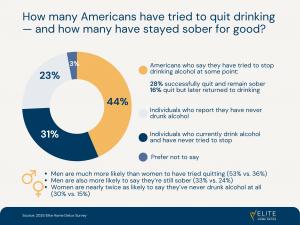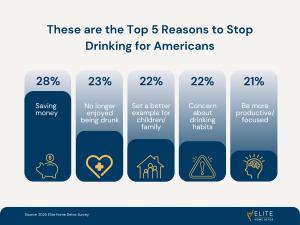Nearly Half of Americans Have Tried to Quit Alcohol — But One in Three Relapse

Elite Home Detox Logo
New national survey uncovers why Americans quit drinking, what causes relapse, and how motivations differ across age, gender, and region.
LOS ANGELES, CA, UNITED STATES, October 22, 2025 /EINPresswire.com/ -- -> 44% of U.S. adults have tried to quit drinking — but 1 in 3 eventually relapse-> Men try to quit more often, but women are twice as likely to stay sober
-> Rising costs are now the top reason Americans give up alcohol, surpassing health scares and fitness goals
Elite Home Detox, a nationwide provider of in-home addiction recovery, conducted a new survey to understand what drives Americans to quit — and what pulls them back.
With over 28 million Americans living with Alcohol Use Disorder (AUD), a condition that makes quitting difficult despite harmful consequences [1], understanding relapse is critical. For many, the journey to sobriety is far from simple. According to the survey, 44% of U.S. adults have tried to quit drinking—but one in three eventually relapse.
Quit Attempts and Lifelong Sobriety
Despite widespread efforts to quit, sobriety often proves elusive: about one in three Americans who attempt to stop drinking eventually return to alcohol. Men are more likely to try quitting (53% vs. 36%), while women are twice as likely to remain sober (30% vs. 15%). Midlife adults lead quit attempts, with 63% having tried to give up alcohol.
Where Sobriety Slips: Austin, Seattle, San Diego Lead in Relapse
Austin has the highest relapse rate at 39%, followed by Seattle (35%) and San Diego (27%). Conversely, Las Vegas (39%), San Antonio (35%), and Los Angeles (33%) show the highest long-term sobriety. Houston (40%), New Orleans (36%), and Charlotte (32%) have the largest shares of adults who have never consumed alcohol, reflecting stronger abstinence traditions in parts of the South.
Top Motivators for Quitting Alcohol
Rising costs (28%) are now the most common reason Americans quit, surpassing health concerns and fitness goals. Other motivations include improving fitness (19%), seeing a loved one struggle (18%), medical advice or health scares (17%), medications that conflict with alcohol (14%), and avoiding post-drinking anxiety (13%).
-> Young adults (27%) most often quit to maintain productivity, while those 35–54 cite health concerns (39%).
-> Men more often mention concern over drinking (24%), women setting a positive example (23%) or losing interest in alcohol (26%).
-> In San Diego (38%), Phoenix (26%), and Boston (33%), concern over excessive drinking drives abstinence.
Why Sobriety Fails: Stress, Loneliness, and Easy Access
Relapse is most often driven by stress and emotional challenges (28%). Social situations (11%), easy access to alcohol (11%), and loneliness (10%) also contribute. These findings highlight how environment and emotional well-being shape sobriety. This is especially notable given that one third of Americans report feeling lonely on a weekly basis [2].
-> Women are more likely to relapse due to stress (31%) and loneliness (16%), while men more often point to easy access to alcohol (13%) as a trigger.
-> Insufficient support is most often cited in Indianapolis (20%), Austin, Washington DC, and Seattle (14%), while Las Vegas (40%), Phoenix (33%), and Dallas (30%) report the highest loneliness-linked relapse rates.
"We underestimate how deeply normalized drinking is in American life — and how isolating that makes sobriety feel. Alcohol-related illnesses kill about 178,000 Americans each year, yet the long-term health impact of drinking remains largely overlooked," said Dr. Abe Malkin, Founder of Elite Home Detox and a member of the American Society of Addiction Medicine, "Lasting sobriety requires motivation, support, and strategies tailored to the individual.”
Regional culture still matters—abstinence is stronger in parts of the South, while wellness-driven sobriety is more common on the West Coast—but emotional resilience and social connection are now key predictors of success.
Read the full study here.
Sources:
[1] National Institute on Alcohol Abuse and Alcoholism: Alcohol Use Disorder (AUD) in the United States
[2] Psychiatry.org - New APA Poll: One in Three Americans Feels Lonely Every Week
Methodology: The survey was conducted by Elite Home Detox in September 2025 among 2,000 U.S. adults aged 21 and older, representative by age, gender, and region.
About Elite Home Detox: Elite Home Detox is a premier provider of in-home addiction recovery and wellness services across the United States. Specializing in medically supervised detox, personalized treatment plans, and holistic support, we bring safe, confidential care directly to the comfort of your home. Our team of licensed professionals is dedicated to making recovery accessible, private, and effective—whether you need assistance with alcohol, opioids, or other substances. To learn more about our services, visit https://www.elitehomedetox.com.
Nadine Bloecher
12100 Collective
email us here
Legal Disclaimer:
EIN Presswire provides this news content "as is" without warranty of any kind. We do not accept any responsibility or liability for the accuracy, content, images, videos, licenses, completeness, legality, or reliability of the information contained in this article. If you have any complaints or copyright issues related to this article, kindly contact the author above.


